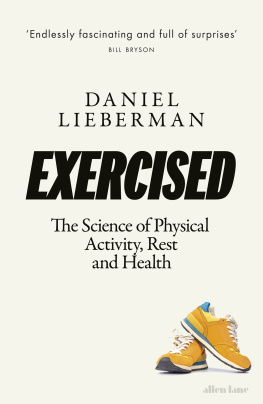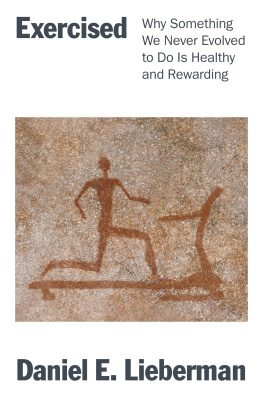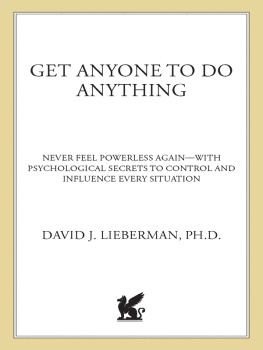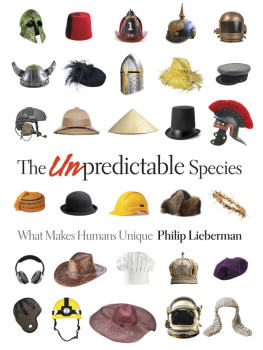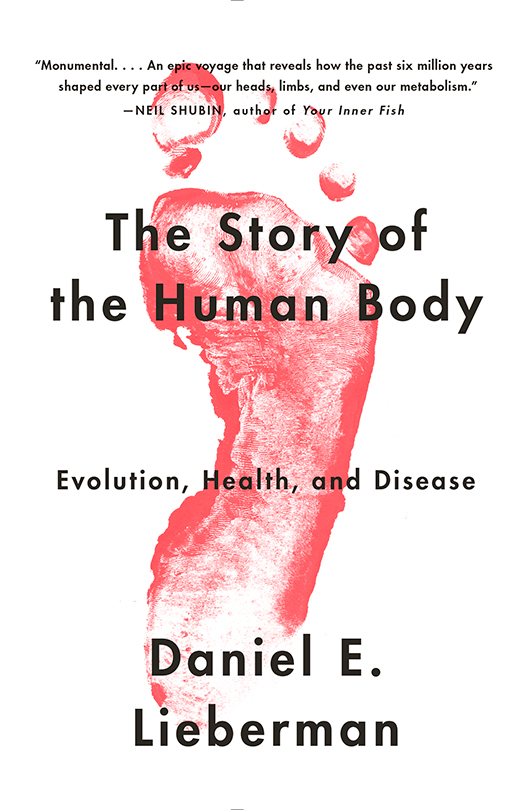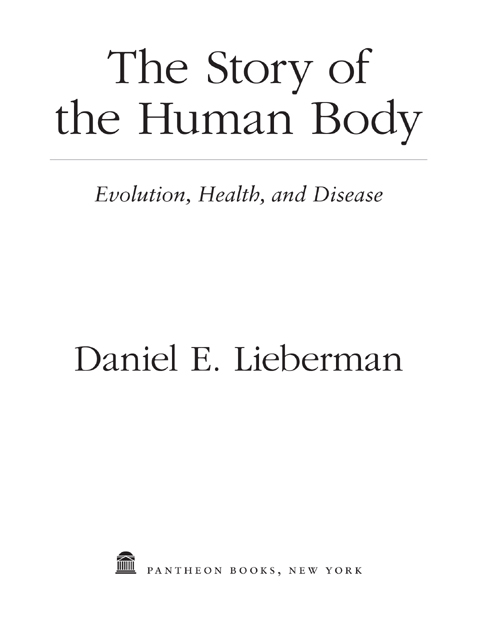Copyright 2013 by Daniel E. Lieberman
All rights reserved. Published in the United States by Pantheon Books, a division of Random House, LLC, New York, and in Canada by Random House of Canada Limited, Toronto, Penguin Random House Companies.
Pantheon Books and colophon are registered trademarks of Random House, LLC.
Library of Congress Cataloging-in-Publication Data
Lieberman, Daniel, [date]
The story of the human body : evolution, health, and disease / Daniel Lieberman.
pages cm
Includes bibliographical references and index.
ISBN 978-0-307-37941-2
1. Human body. 2. Human evolution. 3. Adaptation (Biology) I. Title.
QP38.L74 2013 612dc23 2013011811
www.pantheonbooks.com
eBook ISBN: 978-0-307-90741-7
Hardcover ISBN: 978-0-307-37941-2
Cover design by Matt Dorfman
First Edition
v3.1_r2
To my parents
Contents
What Are Humans Adapted For?
How We Became Bipeds
How the Australopiths Partly Weaned Us Off Fruit
How Nearly Modern Bodies Evolved in the Human Genus
How We Evolved Big Brains Along with Large, Fat, Gradually Growing Bodies
How Modern Humans Colonized the World with a Combination of Brains plus Brawn
The ConsequencesGood and Badof Having Paleolithic Bodies in a Post-Paleolithic World
The Fruits and Follies of Becoming Farmers
The Paradox of Human Health in the Industrial Era
Why Too Much Energy Can Make Us Sick
Why We Are Losing It by Not Using It
Why Everyday Innovations Can Damage Us
Can Evolutionary Logic Help Cultivate a Better Future for the Human Body?
Preface
Like most people, I am fascinated by the human body, but unlike most folks, who sensibly relegate their interest in peoples bodies to evenings and weekends, I have made the human body the focus of my career. In fact, I am extremely lucky to be a professor at Harvard University, where I teach and study how and why the human body is the way it is. My job and my interests allow me to be a jack-of-all trades. In addition to working with students, I study fossils, I travel to interesting corners of the earth to see how people use their bodies, and I do experiments in the lab on how human and animal bodies work.
Like most professors, I also love to talk, and I enjoy peoples questions. But of all the questions I am commonly asked, the one I used to dread the most was What will human beings look like in the future? I hated this question! I am a professor of human evolutionary biology, which means I study the past, not what lies ahead. I am not a soothsayer, and the question made me think of tawdry science fiction movies that depict humans of the distant future as having enormous brains, pale and tiny bodies, and shiny clothing. My reflexive answer was always something along the lines of: Human beings arent evolving very much because of culture. This response is a variant of the standard answer that many of my colleagues give when asked the same question.
I have since changed my mind about this question and now consider the human bodys future to be one of the most important issues we can think about. We live in paradoxical times for our bodies. On the one hand, this era is probably the healthiest in human history. If you live in a developed country, you can reasonably expect all your offspring to survive childhood, to live to their dotage, and to become parents and grandparents. We have conquered or quelled many diseases that used to kill people in droves: smallpox, measles, polio, and the plague. People are taller, and formerly life-threatening conditions like appendicitis, dysentery, a broken leg, or anemia are easily remedied. To be sure, there is still too much malnutrition and disease in some countries, but these evils are often the result of bad government and social inequality, not a lack of food or medical know-how.
On the other hand, we could be doing better, much better. A wave of obesity and chronic, preventable illnesses and disabilities is sweeping across the globe. These preventable diseases include certain cancers, type 2 diabetes, osteoporosis, heart disease, strokes, kidney disease, some allergies, dementia, depression, anxiety, in-somnia, and other illnesses. Billions of people are also suffering from ailments like lower back pain, fallen arches, plantar fasciitis, myopia, arthritis, constipation, acid reflux, and irritable bowel syndrome. Some of these troubles are ancient, but many are novel or have recently exploded in prevalence and intensity. To some extent, these diseases are on the rise because people are living longer, but most of them are showing up in middle-aged people. This epidemiological transition is causing not just misery but also economic woe. As baby boomers retire, their chronic illnesses are straining health-care systems and stifling economies. Moreover, the image in the crystal ball looks bad because these diseases are also growing in prevalence as development spreads across the planet.
The health challenges we face are causing an intense worldwide conversation among parents, doctors, patients, politicians, journalists, researchers, and others. Much of the focus has been on obesity. Why are people getting fatter? How do we lose weight and change our diets? How do we prevent our children from becoming overweight? How can we encourage them to exercise? Because of the urgent necessity to help people who are sick, there is also an intense focus on devising new cures for increasingly common noninfectious diseases. How do we treat and cure cancer, heart disease, diabetes, osteoporosis, and the other illnesses most likely to kill us and the people we love?
As doctors, patients, researchers, and parents debate and investigate these questions, I suspect that few of them cast their thoughts back to the ancient forests of Africa, where our ancestors diverged from the apes and stood upright. They rarely think about Lucy or Neanderthals, and if they do consider evolution it is usually to acknowledge the obvious fact that we used to be cavemen (whatever that means), which perhaps implies that our bodies are not well adapted to modern lifestyles. A patient with a heart attack needs immediate medical care, not a lesson in human evolution.
If I ever suffer a heart attack, I too want my doctor to focus on the exigencies of my care rather than on human evolution. This book, however, argues that our societys general failure to think about human evolution is a major reason we fail to prevent preventable diseases. Our bodies have a storyan evolutionary storythat matters intensely. For one, evolution explains why our bodies are the way they are, and thus yields clues on how to avoid getting sick. Why are we so liable to become fat? Why do we sometimes choke on our food? Why do we have arches in our feet that flatten? Why do we have backs that ache? A related reason to consider the human bodys evolutionary story is to help understand what our bodies are and are not adapted for. The answers to this question are tricky and unintuitive but have profound implications for making sense of what promotes health and disease and for comprehending why our bodies sometimes naturally make us sick. Finally, I think the most pressing reason to study the human bodys story is that it isnt over. We are still evolving. Right now, however, the most potent form of evolution is not biological evolution of the sort described by Darwin, but cultural evolution, in which we develop and pass on new ideas and behaviors to our children, friends, and others. Some of these novel behaviors, especially the foods we eat and the activities we do (or dont do), make us sick.




